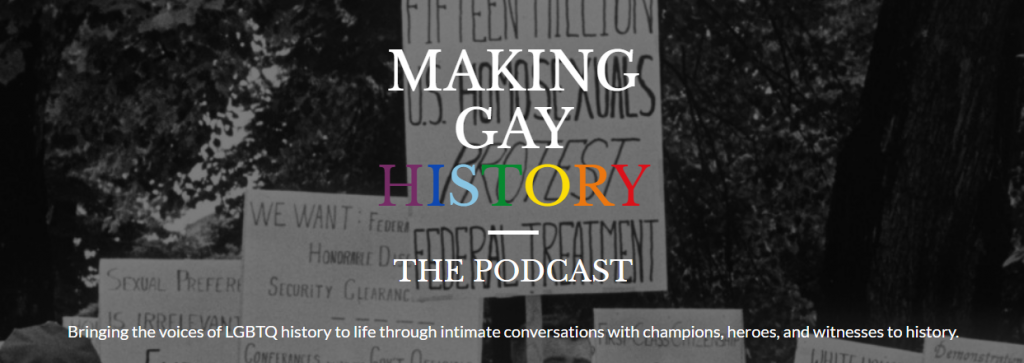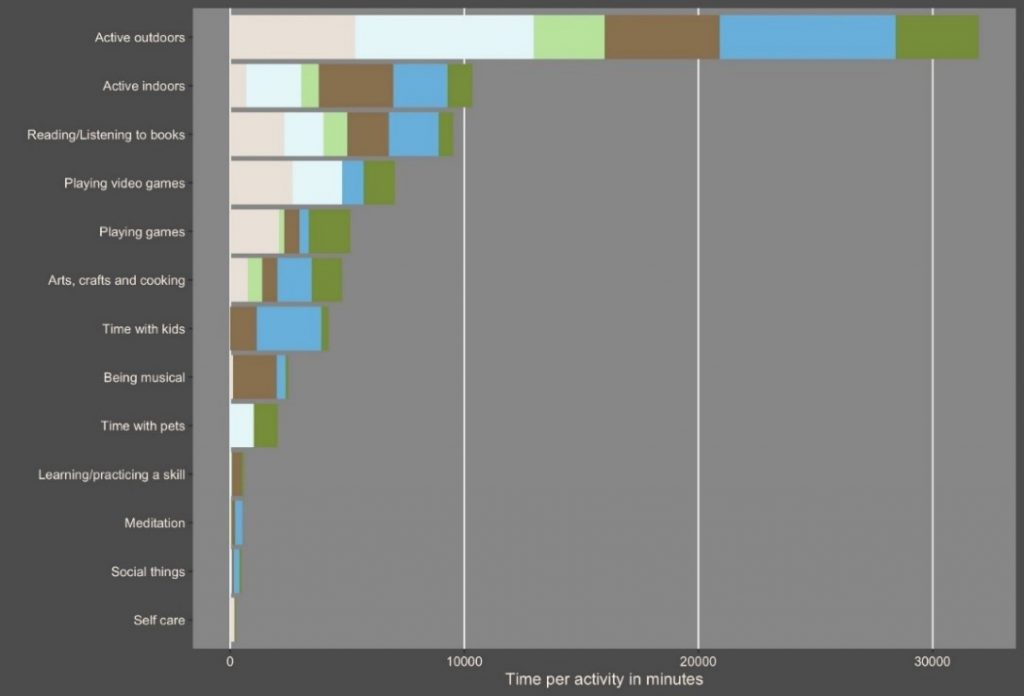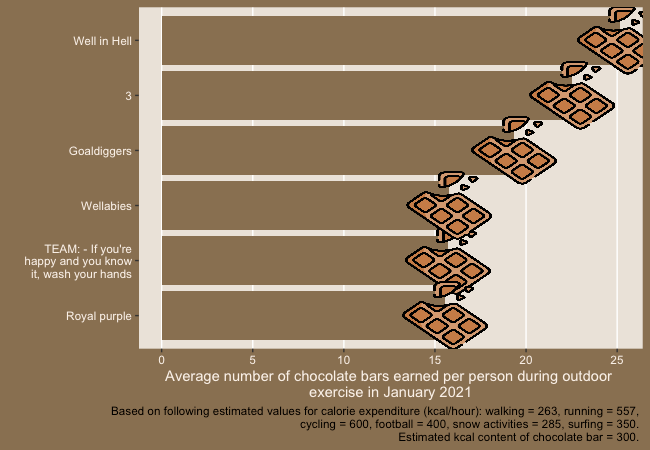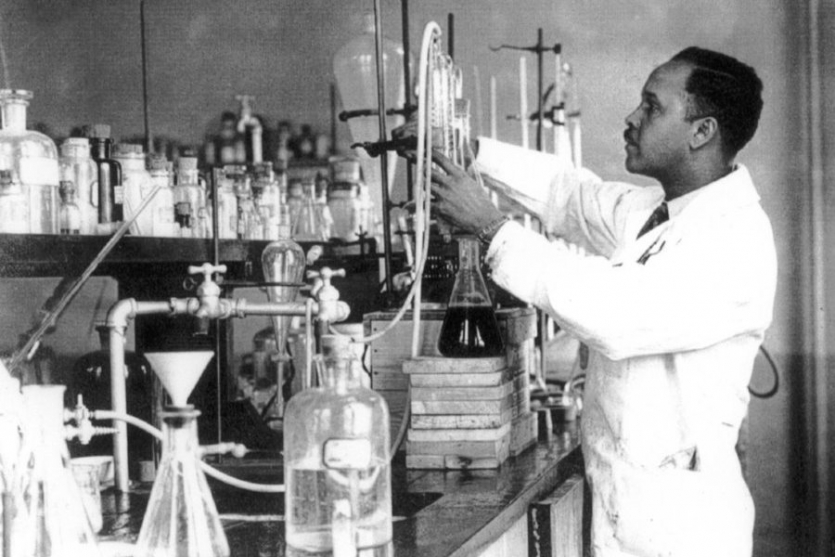For this week’s EDI related reading I’d like to recommend Wonkhe’s “Why can’t we get financial support for disabled students right?” Support to students with a disability is an area often overlooked by Higher Education Institutions and Government – look no further than the Government’s problematic roll out of Universal Credit and it’s accessibility to disabled students across the UK. This is particularly concerning given that it is already twice as likely that a non-disabled student will attain a degree level qualification than a disabled student.
Thanks for reading!
Making Gay History

It is Pride month, which is celebrated every June as a tribute to those who were involved in the Stonewall Riots. It is fitting therefore to share with you the American podcast series ‘Making Gay History’, founded and hosted by Eric Marcus, with a focus on US queer history. Eric narrates the fight for equality through extensive archive conversations with those at the centre of it. For centuries global legislation, religious and cultural philosophies, medicine and public opinion amongst other powerful influencers meant that the majority of LGBT+ people were either accepted and silenced, or persecuted. We know that LGBT+ individuals have always lived and walked this earth, as they are often degraded in the earliest versions of text. Centuries of stigma has meant that an accurate record and contextualisation of historical events and LGBT+ societies have been denied, redacted or destroyed from records. If the LGBT+ history could be described as a library, it would be the Library of Alexandria. In this powerful podcast series, Eric is bringing 20th Century LGBT+ stories to life, providing a platform in which to share the voices of the LGBT+ trailblazers who lived the 20th Century. Most importantly, Eric is creating an archive and history in the making. Each episode is approximately 15 minutes long and available for free, I hope you find the series as inspiring as I have. Furthermore, it is important to note that the basic human rights for many LGBT+ people and other marginalised groups don’t exist in many countries, by documenting historical events, it sets a framework to inspire peoples of the future.
Written by Adam Thompson
EDI Reading: Katy Sawyer

I am currently reading a fascinating and often frustrating book by Empire Magazine’s Helen O’Hara. Women Vs Hollywood: The Rise and Fall of Women in Film offers a never before seen look at how Hollywood, and the cinema industry more widely, has systematically suppressed and constrained the voices of talented women and other marginalised people, much to its own detriment.
Beginning in the age of silent film, it showcases the incredible role women played in the very inception of the industry, and how these stories were rewritten, supressed or lost. Moving through the golden age of Hollywood and on to the modern day, including the #MeToo movement, if you’re interested in film or feminism (or both!) I would definitely recommend giving it a read.
EDI Reading: Hannah Davis

I always learn something from the podcast ‘Rough Translation’. From the Western appropriation of yoga to how different countries discuss race, this podcast gives insight into how we use (and miss-use) language. As I am starting to plan how I want to change and update my lectures and seminars for the next academic year, this episode was perfectly timed. If most people that speak English speak it as a second language, how important is ‘good or perfect’ vocabulary or grammar? Or might it be better if a more ‘universally understandable’ English is more widely accepted?
Let me know your thoughts…
International Women’s Day

Huge thank you to everyone who joined us for our International Women’s Day event on Monday 8th March.
We heard from six inspirational speakers who spoke about their journeys in academia, struggles they’ve overcome and the important research they’re undertaking for SNES. We had over 100 people in attendance and a fascinating, engaging discussion following the talks.
Speakers:
Hannah Davis – Researcher and Lecturer in Animal Science/Agriculture
Chiara Maniaci – BBSRC Discovery Fellow
Pip Moore – Professor of Marine Science
Evelyn Jensen – Lecturer in Molecular Ecology
Margaret Adesugba – Postgraduate Researcher Women in Rural Areas in Nigeria
Hannah Budge – Postgraduate Researcher Women in Agriculture in the Scottish Islands
A challenged world is an alert world and from challenge comes change.
So let’s all choose to challenge. #ChooseToChallenge #IWD2021
MEP wellbeing competition
The Modelling, Evidence and Policy group spent January on a wellbeing competition – in teams of around 5, we recorded the time everyone spent on different activities to get us through the start of another lockdown, and hopefully get us all into good habits for the rest of the lockdown. Anything that can contribute to wellbeing counted – from walking to reading, doing jigsaws, to singing in a choir (online of course)!
The most popular activities were being active outdoors such as walking or running, being active indoors such as workouts or yoga, and reading (Fig. 1). Other popular activities were baking, board games, jigsaws… you name it! In the end, team Goaldiggers won, though Well in Hell earned most chocolate bars (Fig. 2). On average, everyone spent 2,733 minutes on wellbeing activities. With 29 participants, that adds up to 1,321 hours. Well done everyone, and keep up the good work!


Working from home and supporting your mental health
Even though it started off as a novelty, but working from home for long periods of time can start to affect our mental health. You may be experiencing some of the following:
- Feeling isolated, lonely, or disconnected from other people – socially and professionally
- Being unable to ‘switch off from work’
- Having difficulty staying motivated
- Having difficulty prioritising your workload
- Feeling uncertain about your progress, and whether you’re performing ok
- Insomnia and sleep problems
Remember you are not alone and help is always available. Here are two websites with some tips to help your work-life balance.
https://www.nature.com/articles/d41586-020-01059-4
https://www.nature.com/articles/d41586-020-00933-5
Don’t forget you can also download the Health e-Hub app for your phone from the Google Play App Store. It’s simple to use and offers help with a range of issues-physical, mental and financial wellbeing, self-improvement and lifestyle guidance. The log-in is simply username: Newcastle, password: University
Marking the UN’s International Day of Persons with Disabilities
Thursday 3 December is the International Day of Persons with Disabilities (IDPWD), an annual celebration promoting the rights and wellbeing of people with disabilities throughout global society, and raising awareness of persons with disabilities in every aspect of political, social, economic and cultural life.
Here are some suggestions of how you can join us in celebrating the importance of this day:
Wear purple – in celebration of IDPWD, you can join in supporting #PurpleLightUp by wearing something purple, adding the purple backdrop to your Zoom or Teams calls on the 3 December, or inserting this banner in your email signature. Tweet your pledges of support on our University Twitter feed (@UniofNewcastle) and use the #PurpleLightUp. Find out more about the #PurpleLightUp campaign
Disability Interest Group – Join the University’s Disability Interest Group (DIG) and help improve disability inclusion for students, colleagues and visitors. DIG is led by its members and has representation on the University’s Equality, Diversity and Inclusion (EDI) Consultative Group and local EDI meetings. The DIG is for everyone who wants to promote a positive, safe and respectful environment for disabled students, colleagues and visitors. Find out more via the DIG web page
Black History Month

An article by Prof A C Benniston Deputy Head of School
As part of black history month it is worth looking back and recognising the pioneering work of black scientists that tend to go unnoticed. As a chemist myself the career of Percy Lavon Julian is highlighted, and I encourage everyone to read the full article on his life.
Percy Lavon Julian (1899-1975)
Percy Julian studied chemistry at DePauw University in Indiana and graduated top of his class in 1920. After completing a Master’s degree from Harvard he wanted to continue for a PhD but was rejected because of his colour. Despite this, he eventually got a place of study at the University of Vienna, Austria, to work on natural products with Ernst Späth. He obtained his PhD in 1931 and returned to America to work on steroids at DePauw University. With his collaborator Joseph Pikl they studied the natural product physostigmine, which was at the time an effective treatment for glaucoma but difficult to source. Julian as a chemist spotted that it could be synthesised but he was not the only person to recognise the possibility. The famous chemist Robert Robinson was working on the problem and seemed to have beaten Julian by publishing its synthesis. It turned out that Robinson had actually made the wrong compound and in 1935 Julian published the correct synthetic method. His achievement would only be recognised much later by the American Chemical Society, but at the time it was not good enough for him to get promotion at DePauw.
Julian’s move to industry and a job at Glidden was very productive, where his work on soybeans led to the discovery of lecithin, fire retardant chemicals, oils for paints, plant sterols and their use in the production of sex hormones at a low cost. After leaving Glidden Julian set up his own chemical company (Julian Laboratories) again focussing on natural products but this time from the Mexican yam plant. He was successful in producing medicines from cheap starting materials, eventually selling the company and setting up the Julian Research Institute
EDI Reading: Steve Bell
Hello everyone, I’m recommending an alternative to reading this week.
I’ve gone for ‘The Australian Dream’ which is available via the BBC iPlayer. I found the documentary incredibly powerful. It’s central message is that Australia is still to come to grips with its own history, and in particular the treatment of the indigenous people contained within the landmass that we know today as Australia.
The documentary centres on Adam Goodes, an Indigenous Australian who acsends to the summit of his profession (Australian Rules Football), only to be met with a tsunami of racial hatred and abuse after making a stand against racial inequalities during his acceptance speech for the 2014 Australian of the Year award.
Whilst the documentary highlights how horrific humans can treat one another, its also reveals how fortunate we are to share the planet with people like Adam Goodes – have a watch, let me know what you think.
